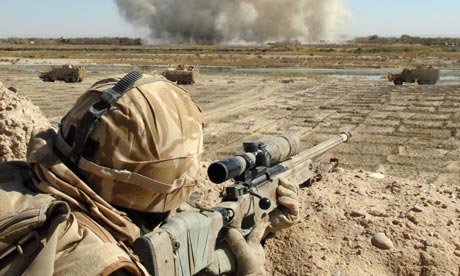
Military British troops in Afghanistan to increase to over 10,000
Hélène Mulholland and agencies
Nov. 30, 2009
Gordon Brown announced today that Britain's total military effort in Afghanistan is to increase to over 10,000 troops.
In a detailed Commons statement, the prime minister confirmed that all the conditions had been met to allow an extra 500 troops to be deployed in December – taking the force level to 9,500.
But he also disclosed that when special forces were included, the "total military effort" in Afghanistan would be in excess of 10,000 troops.

Britain is to send 500 more soldiers to Afghanistan. Photograph: Steve Lewis/Reuters
The statement comes a day before Barack Obama, after months of deliberation, is expected to announce that he will send up to 35,000 more US forces.
The prime minister told MPs that the extra troops would be deployed to "thicken" the troops until January, at which stage they would transition to a "partnering role" with Afghan soldiers.
The move is part of a wider deal with Hamid Karzai, the Afghan president, to send additional Afghan troops to Helmand in 2010 and train more recruits.
The commitment from Karzai was one of the three conditions Brown had set for the additional deployment of British troops, together with pledges of additional personnel by other countries, to bear their share alongside Britain and the US.
Brown told MPs that the secretary general of Nato had assured him that eight other countries had already made offers of additional troops and "other countries are likely to follow". The remaining condition – equipment requirements for the reinforcements – had also been met, he said.
He stressed that no timetable was being set for scaling back the UK force; this would happen only when Afghans were able to provide their own security.
He told MPs that the "military surge" would be complemented by a "political surge" with more Afghan police, a police reform plan and more effective and accountable local administration in Afghanistan.
The government would be "failing in our duty" if it did not work with coalition partners to counter the threat posed by the Taliban and al-Qaida, and help ensure a "safer Britain".
"For a safer Britain, we need a safer Afghanistan", Brown said.
The prime minister issued the statement after chairing a meeting of the national security, international relations and development committee in London today to assess the three conditions.
He said over the weekend that an international conference would be held in London on 28 January to secure agreements from Karzai for the training of 50,000 new troops, a beefed-up police force and action to tackle corruption.
The conference is designed to prepare the way for the gradual handover of provinces to Afghan control – at least five by the end of next year – which could lead to British forces being brought home.
The prime minister will hold a final video conference with the US president before Obama delivers his address at the West Point military academy.
Earlier today the defence secretary, Bob Ainsworth, confirmed the necessary equipment was in place.
The chief of defence staff, Sir Jock Stirrup, who accompanied Ainsworth as he met soldiers from the First Battalion of the Duke of Lancaster Regiment at the training facility, said: "The force level increase of 500 represents between 10 and 15% increase in terms of the boots on the ground patrolling in Helmand.
"In terms of the equipment increase, since August this year it has risen between 33% and almost 100%, so the level of equipment has gone up far more than the level of forces will be going up."
Ainsworth said he hoped Obama would announce a "significant increase" in troop numbers, saying: "It will give them [the troops] the kind of density they need to really take on the insurgents at the kind of speed that we want them to in order to make progress, and to bring on the Afghan national army themselves.
"Because the whole idea is not that we take over in any permanent way the security of Afghanistan, but that we grow the capability of the Afghan national army and the police force so that they can protect their own country and to do that in as short a timescale as is reasonably possible."
One of the main themes of Obama's statement is expected to be the Anglo-US frustration at Pakistan's failure to capture Osama bin Laden and his al-Qaida deputy Ayman al-Zawahiri.
Britain has been encouraged by the actions of the Pakistan army in confronting al-Qaida and the Taliban in South Waziristan, where Islamabad has sent 30,000 troops, and in the North West Frontier province.
But officials believe more needs to be done to confront Pakistani state agencies such as the Inter-Services Intelligence (ISI) agency. The ISI encouraged the Taliban and Kashmiri extremist groups in the 1990s
www.guardian.co.uk/uk/2009/nov/30/britain-500-troops-afghanistan
